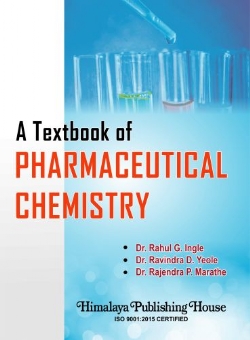A Textbook of Pharmaceutical Chemistry
no information available
Amongst the subjects studied during either diploma or degree pharmacy course, the Pharmaceutical Chemistry or Medicinal Chemistry stands different; this is because it deals with the actual drug (medicine) molecules which are invented, undergo clinical trials, manufactured, formulated, get approval from regulatory authorities, prescribed and used by the end consumer, that is patient, for either preventive or cure of the disorder or disease. These drug molecules act upon the receptors, pathogens at a molecular level and exhibit required pharmacodynamic action. Pharmacy Council of India released the new education regulations in 2020 for the "Diploma in Pharmacy" course wherein the new syllabus of the "Pharmaceutical Chemistry" has been designed to make aware the student about chemistry and uses of drug substance, its storage conditions along with knowledge of the impurities, and way of testing them. This book covers whole syllabus, and is written in a very simple and easy to understand language for the students. This book has been divided in sections such as chapters on general topics, analysis, and nomenclature of organic systems, inorganic and organic pharmaceuticals. This book shall be useful not only to students but also to subject teachers. Contents - Introduction to Pharmaceutical Chemistry 1. General Information 2. Limit Tests 3. Volumetric Analysis 4. Titrations 5. Nomenclature of Organic Chemical Systems 6. Inorganic Pharmaceuticals 7. Drugs Acting on Central Nervous System (CNS) 8. Drugs Acting on Autonomic Nervous System (ANS) 9. Drugs Acting on Cardiovascular System (CVS) 10. Diuretics 11. Hypoglycemic Agents 12. Non-steroidal Anti-inflammatory Agents 13. Anti-infective Agents 14. Antibiotics 15. Anti-neoplastic Agents Bibliography Question Bank ... Read more Read less











